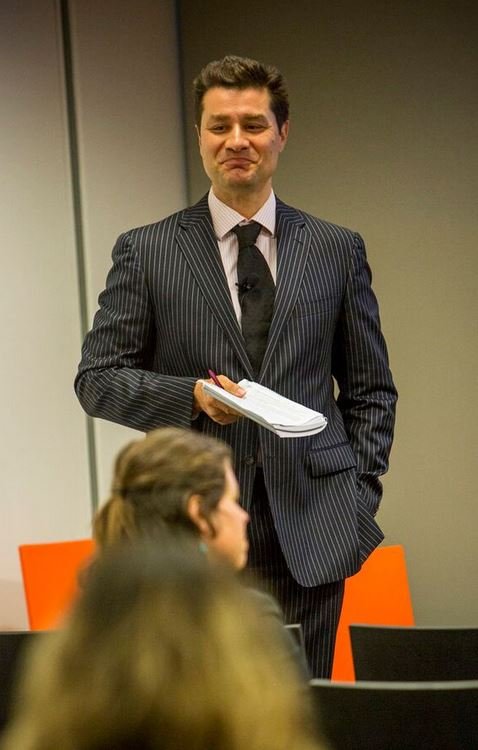What to wear on stage. Spoiler alert: whatever the hell you want
I was recently delivering public speaking training to a group of high-performing young people who had been earmarked as future leaders. The aim of the day was to turn them into gun public speakers. Of the 14 or so participants six expressed their desire to become Prime Minister.
“Fine,” I said. “But take turns.”
At one point I showed them a TEDx talk to demonstrate several of the possibilities and variables of public speaking including storytelling, the importance of the opening minutes and the value or otherwise of taking on stage a prop.
Immediately upon asking for their observations, a young woman in the front row embraced her inner Joan Rivers and criticised the speaker’s appearance.
“Those colours are all wrong. People won’t respect her. She should wear…”
And so it went. So much for the sisterhood. I noted that the fashion police officer was of a gender, age and ethnicity that many people find easy to stereotype and limit. Her dress sense would be the least of her concerns.
For the record I had never noticed anything noticed anything peculiar or off-putting about the TED speaker’s appearance and I certainly hadn’t put her on screen to discuss fashion.
We took a turn in the course of our discussion towards an age-old question many inexperienced public speakers consider: What should I wear on stage / on camera? This is what I told the young fashion critic:
Where whatever you want. Where whatever makes you feel your best but be aware that no matter how you expect your appearance to be interpreted and appreciated there will always be some people in the audience who view you unexpectedly.
Offering myself as an example I explained to this neophyte that some audience members might be sub-conciously reassured to see a man walk on stage in a suit while the person next to them might be thinking: “Oh God. Not another man in a suit.”
Whatever it is, tIn another mood I may present myself to the public in jeans, red loafers, argyle socks, spotted shirt and linen jacket in the hope that I will fit the bill as a hip, free-thinking cultural creative. I know, of course, that 50% of the audience will simply respond to my styling with: “What a tosser.” Another quarter won’t notice what I wear. That’s showbiz.he way you tell your story online can make all the difference.
Dressing up can make you look insecure. Dressing up can make you look supremely confident. It’s all in the eye of the beholder. So are most things – gender, class, age and ethnicity among them.
A lot of public speakers go to a lot of effort to appear as attractive as their genetic limitations will allow. Some members of the audience might take this at face value and find a speaker very appealing. Other audience members will note the speaker’s attractiveness and hold it against them. Others won’t notice a thing. (This final group is deeper than the rest of us.)
All things being equal, being attractive is a big fat help to your career. There have been studies to back up this claim. That said; you can be Cate Blanchet or Benicio del Toro and for a few minutes have the audience in the palm of your hand as a result of your supernatural good looks. However the impact of high cheekbones and husky foreign accents will quickly diminish if you do not deliver the goods.
Similarly I have seen some unprepossessing speakers slowly take their audiences by the scruff of the neck due to their knowledge, storytelling and dry humour.
This is a politically incorrect piece of advice but generally speaking audiences do admire someone who is dressed up for the occasion and if you can throw in a little flair all the better. Of course this does not preclude the shabby and shambolic from having a place in the spotlight. Nor does it mean than you can prepare for a presentation by going shopping as opposed to doing research.
I do like the old one level up rule which for men in particular this is very simple. If you can get away with wearing a T-shirt level up to a collared T-shirt. If you can get away with a collared T-shirt level up to a short sleeve shirt. If you can get away with a short sleeve shirt opt for a long sleeved shirt etc.
To summarise: dress in a way that makes you feel comfortable and confident on stage, secure in the knowledge that even the most conservative or outlandish of ensembles can be interpreted in a myriad of ways. Such is life.
The bigger issue and harsher truth that I kept from my opinionated student was that your dress sense will be a minor influence on how people respond to you. Far more significant is the influence one’s gender, age and ethnicity.
Once again this can play out in a myriad of ways. One person’s voice of experience will be another’s smug baby boomer. One person’s young go-getting woman is another’s inexperienced, entitled pain in the backside.
I’m not sure what the answer to all this is except to ignore it and do your best. And don’t bitch about other people’s looks, age or race. Content and intent however are grounds for comment.
What is vital is that you don’t rule yourself out as a credible speaker / interviewee / expert because you fear that your age, appearance, ethnicity or gender make you somehow implausible. Just get out there and give it your best shot, letting the critics carp. Often their response is more telling them than it is of you.
*Just be prepared for people to grumble regardless.





